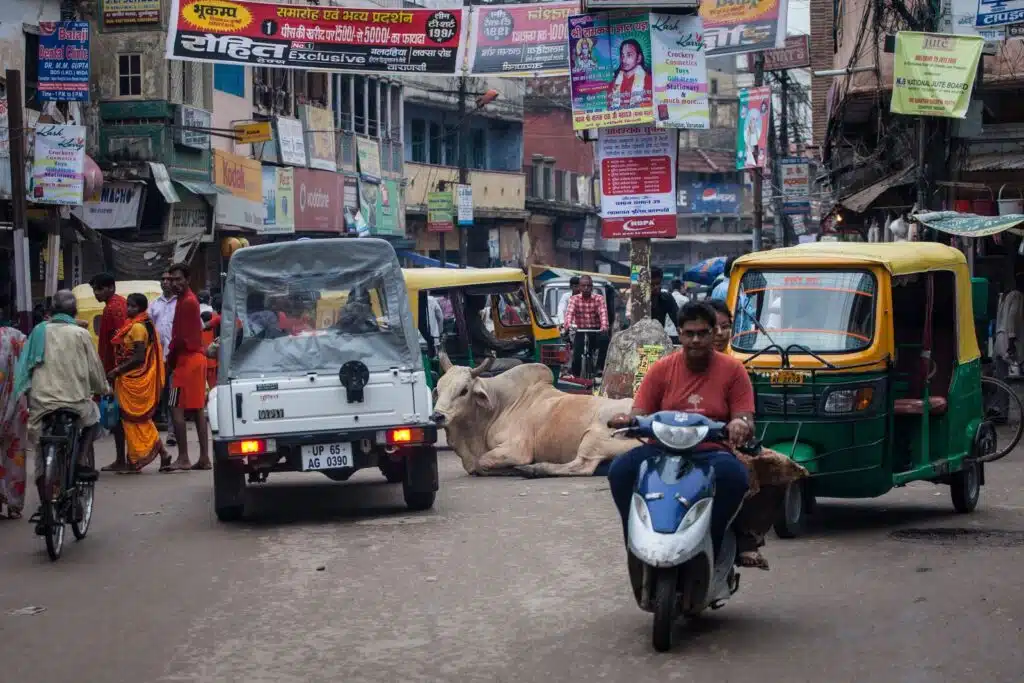One of the most fascinating aspects of exploring different cultures is experiencing the culture shock of visiting new places. Culture shocks occur when we encounter unfamiliar customs, behaviors, and ways of life and can significantly enhance our trips. From food etiquette to social norms and religious practices, these cultural differences can be eye-opening experiences.
1. Food Etiquette and Cuisine Variations

When traveling to different countries, one of the most common culture shocks is experiencing the local food etiquette and cuisine variations. From chopstick etiquette in Asian countries to eating with your hands in certain parts of Africa and the Middle East, these practices can be vastly different from what travelers are accustomed to. Additionally, the range of flavors and ingredients used in different cuisines can be surprising. Whether it’s trying spicy street food in Thailand or indulging in the complex flavors of Indian curries, exploring new culinary horizons can be an exciting yet shocking experience.
2. Personal Space and Public Behavior

In some cultures, personal space is highly valued, while in others, it may be more limited. Travelers from countries where people maintain a larger personal space bubble might find it challenging to adjust to crowded public transportation or bustling markets where personal boundaries are often overlooked. Similarly, the concept of queuing and waiting in line can vary greatly. In some countries, a more relaxed approach is taken, while in others, queueing is strictly adhered to. Understanding and adapting to these different social norms can be a significant culture shock for travelers.
3. Greetings and Non-Verbal Communication

Greetings and non-verbal communication can vary widely across cultures, leading to unexpected culture shocks. While a handshake might be the standard greeting in Western countries, other cultures have different customs. For instance, in certain countries in Asia, a bow or a slight nod is more customary. In some parts of the world, cheek kissing is a standard greeting, while in others, it may be seen as inappropriate or reserved for close friends and family. Learning and adapting to these cultural norms is crucial to avoid misunderstandings and show respect for local customs.
4. Time Perception and Punctuality

Different cultures have varying perceptions of time and punctuality, which can be a source of culture shock for travelers. In some countries, such as Switzerland or Germany, being on time is highly valued and considered a sign of respect. However, in other cultures, such as in parts of Latin America or the Middle East, being a few minutes late is not uncommon and may be more socially acceptable. Travelers from punctuality-driven cultures might find adjusting to a more relaxed attitude towards time frustrating or confusing. Patience and understanding are essential when navigating these cultural differences.
5. Social Norms and Dress Codes

Social norms and dress codes can differ significantly from one culture to another, often catching travelers off guard. In some conservative societies, such as those in the Middle East, dressing modestly is expected, with women covering their shoulders and legs. On the other hand, in more liberal societies, like those in Western countries, casual attire is generally accepted. Travelers must research and understand the cultural norms and dress codes of the country they visit to ensure they dress appropriately and respect the local customs.
6. Bathroom and Toilet Facilities

The worldwide differences in bathroom and toilet facilities can be a significant culture shock for travelers. In some countries, squat toilets are prevalent, requiring visitors to adjust to a different way of using the facilities. Moreover, the availability of toilet paper, the cleanliness of public restrooms, and the norms regarding bathroom hygiene can vary significantly from one culture to another. Travelers must familiarize themselves with these differences beforehand to avoid surprises or discomfort.
7. Social Hierarchy and Respect

Social hierarchy and the concept of respect can vary significantly across cultures, leading to culture shocks for travelers. In some societies, there is a strong emphasis on hierarchical relationships and showing deference to elders or authority figures. This can be seen in Asian cultures, where respecting seniority and maintaining harmony within social groups are highly valued. On the other hand, in more individualistic cultures, such as those in Western countries, there may be a greater emphasis on equality and less strict adherence to social hierarchies. Understanding and navigating these cultural dynamics can be crucial to avoid inadvertently offending or disrespecting locals.
8. Gender Roles and Expectations

Gender roles and expectations can differ significantly from one culture to another, causing culture shocks for travelers. In some societies, traditional gender roles are deeply ingrained, with specific expectations for men and women regarding behavior, clothing, and social interactions. For example, in conservative cultures, women may be expected to dress modestly and adhere to certain behavioral norms. Conversely, in more progressive societies, there may be a greater emphasis on gender equality and individual expression. Travelers must know these cultural nuances to navigate interactions respectfully and avoid unintentionally crossing boundaries.
9. Religious Customs and Practices

Religion plays a significant role in many cultures, and encountering different religious customs and practices can be a culture shock for travelers. From witnessing elaborate ceremonies and rituals to experiencing the influence of religious beliefs on daily life, these encounters can be both fascinating and unfamiliar. For example, visiting Buddhist temples in Southeast Asia may require certain etiquettes, such as removing shoes and covering shoulders and legs. Similarly, being mindful of prayer times and respecting places of worship in predominantly Muslim countries is crucial. By learning about and appreciating different religious practices, travelers can enhance their understanding of local cultures and foster greater respect and acceptance.
10. Attitudes Towards Money and Tipping

Attitudes towards money and tipping can vary widely across cultures, leading to unexpected culture shocks for travelers. In some countries, haggling over prices is common, and negotiating the cost of goods and services is expected. However, in other cultures, such as in many Western countries, fixed pricing is the norm, and attempting to negotiate can be rude or inappropriate. Additionally, tipping customs can differ significantly, with some cultures emphasizing generous tipping and others considering it unnecessary. Familiarizing oneself with local customs regarding money and tipping can help avoid awkward situations and show respect for local practices.
11. Embrace Traditional Culture

More than 90% of Mongolia’s population is Mongol; the country is protective of its traditional values and nomadic lifestyles. Outside of its capital, much of the country is steppe, where farmers herd goats and camels. One person enjoyed visiting Mongolia and compared its uniqueness to Bolivia, the only country in the Americas with a majority indigenous population. He said that in rural communities, “They burn offerings to gods such as Pachamama.”
12. Public Transportation

Public transportation varies significantly from country to country and between cities. You may need to rent a car, which may be slower to get around due to high traffic volumes, like in most large cities. You’ll need to understand the specific transportation modes, including buses, trains, and taxis. Recognizing that everything is not said or printed in English may add to the disorientation. Luckily, you may use your phone to translate some of the basic terms.
13. Chaos in the Streets

Americans who braved the frenetic streets of Times Square admitted that it was tame compared to India. Many agreed that they found India challenging, where personal space is narrower than in other countries. It has a distinct culture and history. One has to be prepared for the crazy traffic and chaos in the streets, as you may see people walking, rickshaws, and food carts vying for space with the cows.
14. Clean Streets

Many travelers are surprised by the cleanliness of the roads and streets of many countries worldwide. Asian countries like Singapore and Japan are often considered among the best. One tourist wondered if people take their garbage home as cans aren’t visible. Copenhagen, Denmark, was recently voted the greenest city in Europe after the city pledged to be carbon-neutral by 2025.
15. Reverse Culture Shock

After traveling for longer than a week or two, some people experience reverse culture shock when adjusting to life at home. You may be disoriented at home, returning to regular habits and savoring some of the experiences you enjoyed while traveling when every day was adventurous. Back at home, you have responsibilities that you shelved, like driving to work and cooking, and it may take time to transition to your old habits. You may find yourself going through your photos and videos of your trip.
10 Annoying Phrases Men Never Want to Hear From Women
Photo Credit: Adobe Stock
Communication is integral to any healthy relationship, but sometimes our words can cause more harm than good. While it’s essential to be mindful of our language and how it affects others, there are certain phrases that men might find irritating, frustrating, or even offensive to hear from women.
10 Iconic Snacks That Should Have Never Been Discontinued
Photo Credit: Adobe Stock
Snacks are a staple of our daily lives, satisfying our cravings and giving us that extra energy boost throughout the day. Some snacks, however, have become a part of our culture and have gained a loyal fan base. These iconic snacks have become a part of our childhood memories, and even after their discontinuation, they still hold a special place in our hearts.
These 10 Healthy Foods Are Just As Satisfying As Junk Food
Photo Credit: Shutterstock
In a world where unhealthy foods are often marketed as indulgent treats, it can be easy to overlook the delicious and satisfying healthy options available. Luckily, the internet is filled with people who are eager to share their favorite healthy foods that taste just as good as the less nutritious options. Here are some of the top suggestions from individuals who have found healthy foods that satisfy their cravings just as well as their less healthy counterparts.
You’re Missing Out If You’ve Never Tried These 10 Gas Station Snacks
Photo Credit: Adobe Stock
When you think of gas station snacks, your mind might immediately jump to the usual chips, candy bars, and energy drinks. However, many gas stations offer a surprisingly wide variety of unique snacks that often go overlooked. From Pickle in a Pouch to Moon Cheese, there are plenty of options to choose from that can satisfy your cravings and offer a new taste experience.
You’re Way Too Polite If You Do These 10 Things
Photo Credit: Deposit Photos
Being polite is generally considered a good quality, but, as with most things, it can be taken too far. It’s important to remember that being overly polite can have negative consequences. If you struggle to say ‘no’ or get pushed around by others, you may be too polite for your good. This blog post will look at ten signs of being too polite and how to break out of the habit of excessive politeness. Whether you have difficulty saying no in social situations or putting others before yourself, these tips help you take charge of your life and set better boundaries with others.
This article was produced and syndicated by The Cents of Money.
Hi There!
With a passion for investing and personal finance, I began The Cents of Money to help and teach others. My experience as an equity analyst, professor, and mom provide me with unique insights about money and wealth creation and a desire to share with you.






